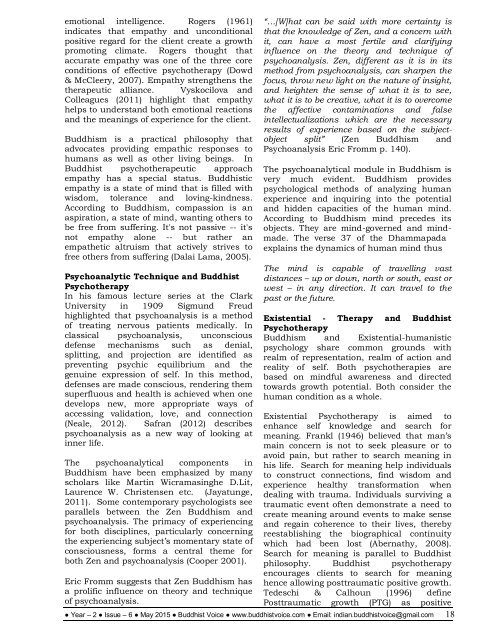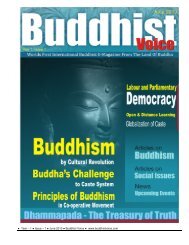BV - May 2015 Yr 2 Issue 6 E
Create successful ePaper yourself
Turn your PDF publications into a flip-book with our unique Google optimized e-Paper software.
emotional intelligence. Rogers (1961)<br />
indicates that empathy and unconditional<br />
positive regard for the client create a growth<br />
promoting climate. Rogers thought that<br />
accurate empathy was one of the three core<br />
conditions of effective psychotherapy (Dowd<br />
& McCleery, 2007). Empathy strengthens the<br />
therapeutic alliance. Vyskocilova and<br />
Colleagues (2011) highlight that empathy<br />
helps to understand both emotional reactions<br />
and the meanings of experience for the client.<br />
Buddhism is a practical philosophy that<br />
advocates providing empathic responses to<br />
humans as well as other living beings. In<br />
Buddhist psychotherapeutic approach<br />
empathy has a special status. Buddhistic<br />
empathy is a state of mind that is filled with<br />
wisdom, tolerance and loving-kindness.<br />
According to Buddhism, compassion is an<br />
aspiration, a state of mind, wanting others to<br />
be free from suffering. It's not passive -- it's<br />
not empathy alone -- but rather an<br />
empathetic altruism that actively strives to<br />
free others from suffering (Dalai Lama, 2005).<br />
Psychoanalytic Technique and Buddhist<br />
Psychotherapy<br />
In his famous lecture series at the Clark<br />
University in 1909 Sigmund Freud<br />
highlighted that psychoanalysis is a method<br />
of treating nervous patients medically. In<br />
classical psychoanalysis, unconscious<br />
defense mechanisms such as denial,<br />
splitting, and projection are identified as<br />
preventing psychic equilibrium and the<br />
genuine expression of self. In this method,<br />
defenses are made conscious, rendering them<br />
superfluous and health is achieved when one<br />
develops new, more appropriate ways of<br />
accessing validation, love, and connection<br />
(Neale, 2012). Safran (2012) describes<br />
psychoanalysis as a new way of looking at<br />
inner life.<br />
The psychoanalytical components in<br />
Buddhism have been emphasized by many<br />
scholars like Martin Wicramasinghe D.Lit,<br />
Laurence W. Christensen etc. (Jayatunge,<br />
2011). Some contemporary psychologists see<br />
parallels between the Zen Buddhism and<br />
psychoanalysis. The primacy of experiencing<br />
for both disciplines, particularly concerning<br />
the experiencing subject’s momentary state of<br />
consciousness, forms a central theme for<br />
both Zen and psychoanalysis (Cooper 2001).<br />
“…[W]hat can be said with more certainty is<br />
that the knowledge of Zen, and a concern with<br />
it, can have a most fertile and clarifying<br />
influence on the theory and technique of<br />
psychoanalysis. Zen, different as it is in its<br />
method from psychoanalysis, can sharpen the<br />
focus, throw new light on the nature of insight,<br />
and heighten the sense of what it is to see,<br />
what it is to be creative, what it is to overcome<br />
the affective contaminations and false<br />
intellectualizations which are the necessary<br />
results of experience based on the subjectobject<br />
split” (Zen Buddhism and<br />
Psychoanalysis Eric Fromm p. 140).<br />
The psychoanalytical module in Buddhism is<br />
very much evident. Buddhism provides<br />
psychological methods of analyzing human<br />
experience and inquiring into the potential<br />
and hidden capacities of the human mind.<br />
According to Buddhism mind precedes its<br />
objects. They are mind-governed and mindmade.<br />
The verse 37 of the Dhammapada<br />
explains the dynamics of human mind thus<br />
The mind is capable of travelling vast<br />
distances – up or down, north or south, east or<br />
west – in any direction. It can travel to the<br />
past or the future.<br />
Existential - Therapy and Buddhist<br />
Psychotherapy<br />
Buddhism and Existential-humanistic<br />
psychology share common grounds with<br />
realm of representation, realm of action and<br />
reality of self. Both psychotherapies are<br />
based on mindful awareness and directed<br />
towards growth potential. Both consider the<br />
human condition as a whole.<br />
Existential Psychotherapy is aimed to<br />
enhance self knowledge and search for<br />
meaning. Frankl (1946) believed that man’s<br />
main concern is not to seek pleasure or to<br />
avoid pain, but rather to search meaning in<br />
his life. Search for meaning help individuals<br />
to construct connections, find wisdom and<br />
experience healthy transformation when<br />
dealing with trauma. Individuals surviving a<br />
traumatic event often demonstrate a need to<br />
create meaning around events to make sense<br />
and regain coherence to their lives, thereby<br />
reestablishing the biographical continuity<br />
which had been lost (Abernathy, 2008).<br />
Search for meaning is parallel to Buddhist<br />
philosophy. Buddhist psychotherapy<br />
encourages clients to search for meaning<br />
hence allowing posttraumatic positive growth.<br />
Tedeschi & Calhoun (1996) define<br />
Eric Fromm suggests that Zen Buddhism has<br />
a prolific influence on theory and technique<br />
of psychoanalysis.<br />
Posttraumatic growth (PTG) as positive<br />
● Year – 2 ● <strong>Issue</strong> – 6 ● <strong>May</strong> <strong>2015</strong> ● Buddhist Voice ● www.buddhistvoice.com ● Email: indian.buddhistvoice@gmail.com 18



